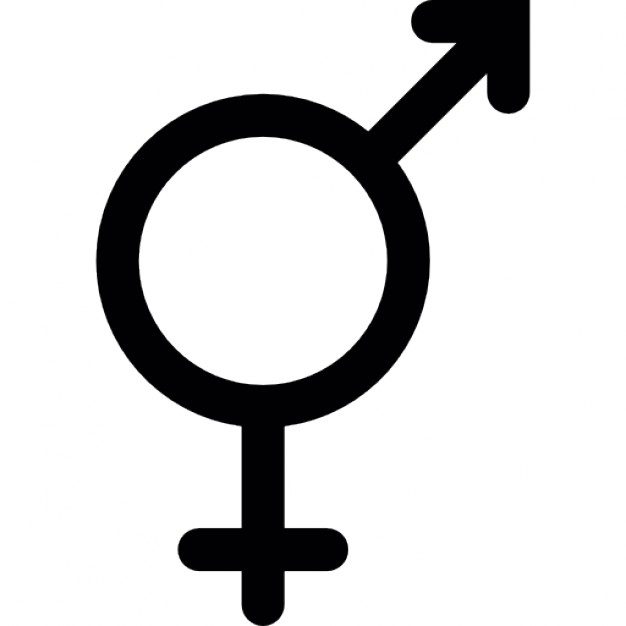Publications
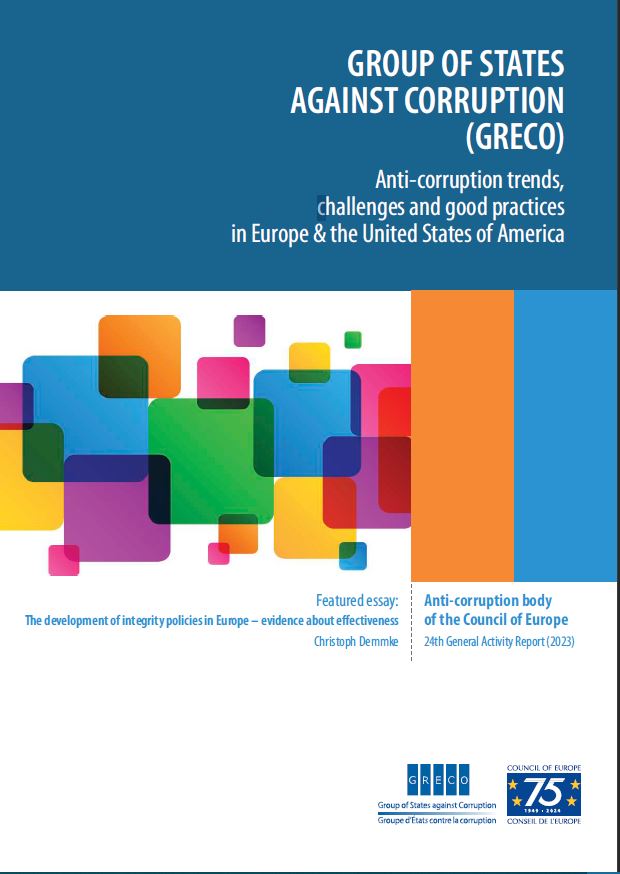
24th General Activity Report (2023)

In its annual report for 2023, GRECO expresses concern about the slow implementation of its recommendations on preventing corruption among parliamentarians, compared to other professional groups. It also underlines that several judicial systems must be further reformed to guarantee the independence of judges and prosecutors, and to strengthen the integrity rules that are applied to them.
Regarding its 5th evaluation round, which focuses on preventing corruption and promoting integrity among top executive functions of central government and law enforcement agencies, GRECO´s findings show that transparency, oversight and accountability remain at stake.
GRECO’s president, Marin Mrčela, said: “There is no transparency without accountability, as impunity only aggravates the risk of corruption and undermines public trust. More regulation and rigour are needed to tackle corruption risks related to the highest executive functions, in particular regarding contact with third parties and lobbyists, and to ensure the effectiveness of integrity policies. Individuals with top executive functions should lead by example.”
GRECO considers that states should ensure that their institutional and legislative integrity frameworks apply entirely and directly not only to high-level civil servants but also to ministers, their political advisers and other politically appointed staff and certain heads of state. Significant improvements are needed in areas such as adopting and implementing codes of conduct, managing conflicts of interest and lobbying, monitoring asset declarations and ensuring their transparency, limiting immunities, access to information and “revolving doors” practices.
Regarding law enforcement agencies, GRECO underscores that states should do more to ensure that corrupt behaviour and integrity failings are adequately addressed at all levels within the hierarchy and to prevent undue interference of governments in police activities. There is a need to adopt comprehensive anti-corruption and integrity policies for the police, as well as to improve the management of conflicts of interest and secondary employment, the protection of whistleblowers, and recruitment, promotion and dismissal processes.
GRECO finds good progress in several areas, such as the introduction of codes of conduct for persons with top executive functions, an increased mapping of risks faced by such persons during their mandates and clear efforts made to prevent corruption in high-risk functions within law enforcement.
By the end of 2023, GRECO had published reports on 21 states evaluating their compliance with its 5th evaluation round recommendations. GRECO had evaluated 21 states as part of its 5th evaluation round. According to GRECO´s follow-up reports published as of 31 December 2023, states had fully or partly implemented 58% of GRECO´s recommendations with respect to top executive functions of central governments (compared to 45% at the end of 2022). As regards law enforcement agencies, the proportion of fully or partly implemented recommendations grew slightly, from 63% in 2022 to 67% in 2023.
At the end of 2023, 54% of GRECO´s recommendations regarding MPs, judges and prosecutors had been fully implemented, 31% had been partly implemented and 15% remained non-implemented. The highest proportion of non-implemented recommendations concerned MPs (20%), compared to judges (13.5%) and prosecutors (10%).
GRECO is concerned that, in some countries, progress is still limited concerning the application of codes of conduct for MPs, the transparency of systems for declaring assets, and the regulation of lobbying, and insufficient progress has been made in ensuring the independence of judicial councils from the legislative and executive powers. It does note positively several areas, notably an overall improved transparency of legislative processes with meaningful public participation.
GRECO celebrates its 25th anniversary in 2024. GRECO was established on 1 May 1999 as a Council of Europe Enlarged Partial Agreement by 17 states (Belgium, Bulgaria, Cyprus, Estonia, Finland, France, Germany, Greece, Iceland, Ireland, Lithuania, Luxembourg, Romania, Slovakia, Slovenia, Spain and Sweden). Today, it has 48 members: the 46 Council of Europe member states, the USA and Kazakhstan. The EU joined in 2019 as an observer.
GRECO is currently preparing its 6th evaluation round, which will focus on preventing corruption and promoting integrity in local and regional authorities and will be launched in 2025.
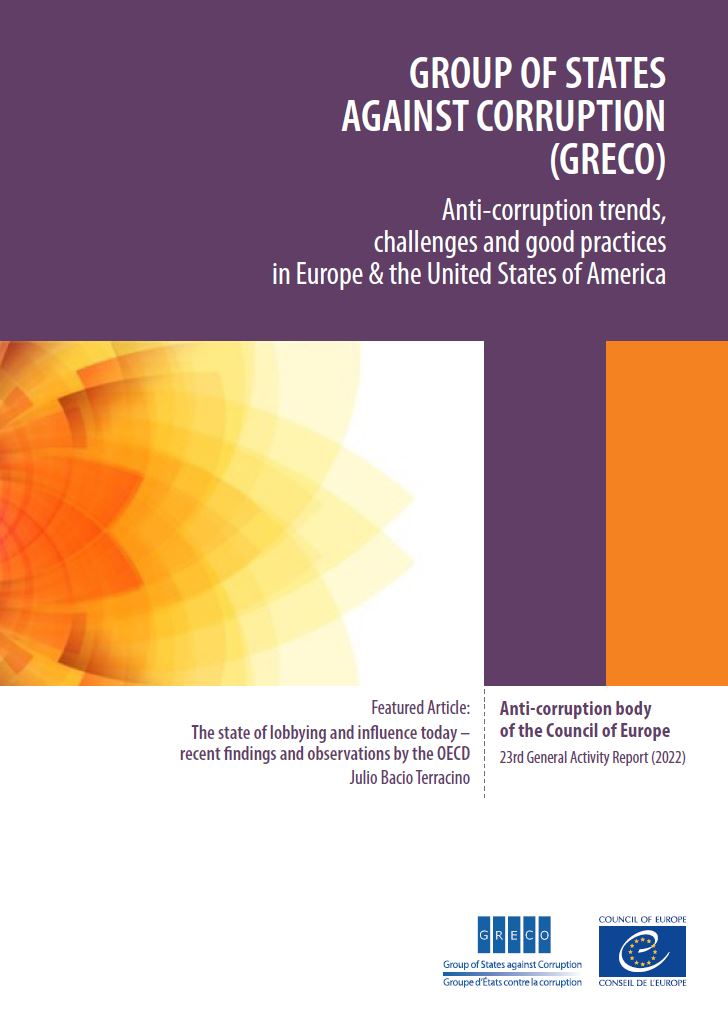
23rd General Activity Report (2022)

In its annual report for 2022, GRECO recalls the role that access to information plays in ensuring public transparency and in facilitating the pursuit of corrupt behaviour. It regrets that in some countries, governments are still accorded a broad margin of discretion for determining what is in the public domain and whether to exclude certain documents from free access. Government entities are often reluctant to disclose information and prefer to apply exceptions enabling them to withhold all or parts of information requested. In addition, the application of laws on freedom of access to information is too often inconsistent across government entities, which shows the need for training to create a common understanding and application of national freedom of information laws.
GRECO’s president Marin Mrčela said: “Governments should guarantee the overall principle of transparency of public documents in practice. Any exception to the rule of public disclosure should be limited to a minimum and be thoroughly justified. When it comes specifically to public procurement, public scrutiny and access to official documents are key to effectively preventing corruption”.
In its evaluation reports, GRECO has reminded countries that they should apply the principles of the Committee of Ministers recommendation on access to official documents and the Council of Europe Convention on Access to Official Documents, which require that any limitation to the right of access to official documents must be necessary in a democratic society, proportionate, and only applied if there is not an overriding interest in disclosure.
In its annual report, GRECO recalls that in its 5th evaluation round – focusing on the prevention of corruption and the promotion of integrity among central governments and law enforcement – it has identified a number of shortcomings concerning access to information in the law-making process. Public consultation timeframes are often not respected, which hinders the consultation process in producing meaningful contributions and influencing the legislative process.
GRECO welcomes states’ progress in implementing its recommendations to prevent corruption and promote integrity but underlines the need to strengthen the level of compliance. By the end of 2022, slightly less than half of GRECO’s recommendations on central governments’ top officials and just under two thirds of those concerning the police had been implemented, either fully or partly.
States continued to make progress in implementing recommendations from GRECO´s 4th evaluation round concerning MPs, judges and prosecutors: Half of those recommendations (49.5%) had been fully implemented at the end of 2022, up from 45% the previous year. States had partly implemented a third of the outstanding recommendations, while 17% remained not implemented.
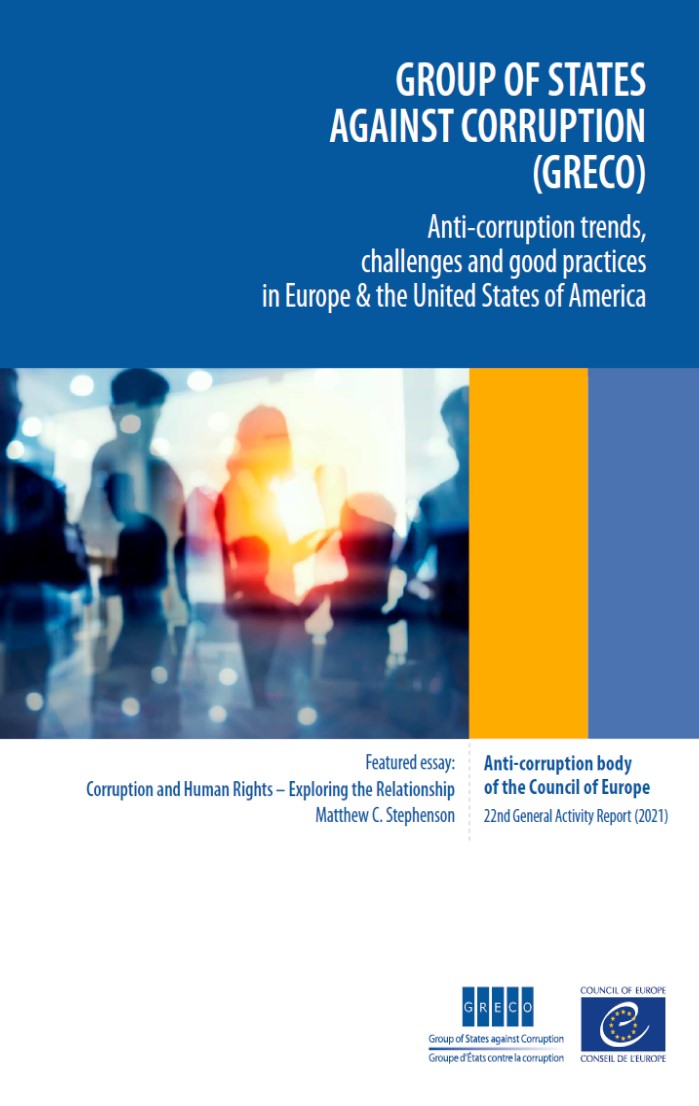
22nd General Activity Report (2021)

GRECO, in its 22nd General Activity Report, states that European governments should increase the transparency and the accountability around lobbying to ensure that members of the public know which actors seek to influence political decisions so that the risk of corrupt practices can be reduced.
While acknowledging that lobbying is a legitimate activity that can contribute to the democratic process and well-informed decision-making, GRECO recalls that it is essential that anti-corruption standards are fully respected. This can be by setting up lobbyist registers, indicating if contacts are formal or informal, the identity of the persons who were in contact and the subjects discussed.
GRECO’s president Marin Mrčela said: “Public confidence has been tested to the limit in some cases in recent times as corruption scandals regularly emerge in the media. The public has a right to know who is influencing political decisions. Gaining access to this kind of information should be simple and quick. Governments should adopt detailed rules to prevent corruption risks.”
“In general terms, in 2021 we saw progress in the implementation of GRECO´s recommendations but improvements should be further accelerated, in particular concerning anti-corruption measures in respect of MPs and top executive functions of central governments. In addition, it is crucial that, once reforms are adopted, anti-corruption measures are fully operational and effective”, he added.
The report reviews the measures to prevent corruption taken in GRECO’s member states in 2021 under its 5th evaluation round, which focuses on central governments – including top executive functions - and law enforcement agencies. It also examines the steps taken under GRECO’s 4th evaluation round - which concerns parliamentarians, judges and prosecutors.
By the end of 2021, GRECO had completed the evaluation of 23 states in respect of top executive functions in central governments and law enforcement agencies. The 15 compliance reports published as of 31 December 2021 showed that progress in the implementation of the recommendations was slow: only 18% of the recommendations had been fully implemented, 38% had been partly implemented and 44% remained non-implemented.
During 2021, GRECO member states’ compliance with 4th evaluation round recommendations improved: Almost half had been fully implemented at the end of 2021 (45% compared to 39% at the end of 2020), whilst 37% had been partially implemented and 18% remained non-implemented. The lack of progress in the compliance with recommendations concerning MPs remained a challenge: 36% of the recommendations had been fully implemented, compared to 47% in respect of judges and 54% in respect of prosecutors).
At the end of 2021, 13 countries were subject to GRECO’s 4th evaluation round non-compliance procedure: Armenia, Belgium, Bosnia and Herzegovina, Denmark, Germany, Hungary, Republic of Moldova, Poland, Romania, Turkey and Ukraine, as well as Luxembourg and Serbia, which due to new compliance reports published in 2022 are no longer subject to it.
The report features an article by Matthew C. Stephenson, Eli Goldston Professor of Law, Harvard Law School, on the relationship between corruption and human rights.
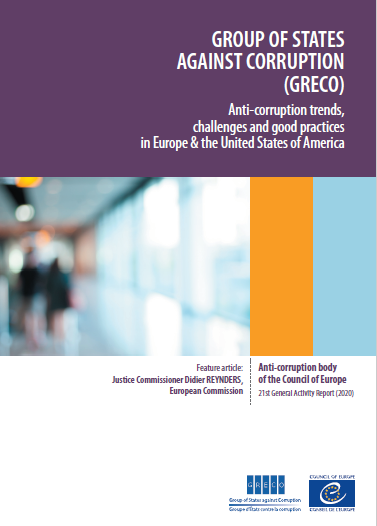
21st General Activity Report (2020)

GRECO, in its 21st General Activity Report, states that Governments should rigorously manage the corruption risks that have emerged due to the need to take extraordinary measures to combat the COVID-19 pandemic, including the infusion of large amounts of money into the economy to alleviate its economic and social impact.
GRECO underlines that for more than one year now governments have had to put in place emergency measures that have implied concentrations of powers and derogations of fundamental rights, measures which go hand in hand with corruption risks that should not be underestimated. In the context of the pandemic, GRECO’s president Marin Mrčela had called on states to closely follow the guidelines issued by GRECO in 2020 to prevent corruption risks.
Secretary General Marija Pejčinović Burić said: “In the challenging times we face, governments should step up their efforts to ensure that all policies and actions aimed at addressing the public health and economic crises meet anti-corruption standards. Adequate legislation and institutional frameworks to combat corruption are not enough. We must see these standards applied effectively in practice, and governments must act with transparency and accountability”.
The report reviews the measures to prevent corruption taken in GRECO’s member states in 2020 in its 4th round evaluation – which concerns parliamentarians, judges and prosecutors - and its 5th evaluation round, which focuses on central governments – including top executive functions - and law enforcement agencies. Full statistics are available.
The 5th evaluation round was fully underway by the end of the year, with evaluation reports on 21 states already completed. Key results in most of the countries evaluated were the adoption or revision of codes of conduct for top executive functions, while one of the major challenges observed was the collection of official information in line with freedom of information laws. Topics such as lobbying, conflicts of interest and “revolving doors” are addressed in the General Activity Report, as well as analyses of the main anti-corruption issues relevant to law enforcement agencies (anti-corruption and integrity policies, human resources policies and the protection of whistleblowers).
The report features an article by the EU Commissioner for Justice Didier Reynders.

20th General Activity Report (2019)

The 20th General Activity Report reviews the measures to prevent corruption taken in GRECO’s member states in 2019 in respect of parliamentarians, judges and prosecutors, as well as in central governments – including top executive functions - and law enforcement agencies. GRECO’s 20th Anniversary has marked the consecration of its expertise in the field of the fight against corruption, gained over the years.
Secretary General Marija Pejčinović Burić stated: “Corruption undermines citizens’ trust in democracy and in democratic institutions. Implementing effective anti-corruption measures and promoting integrity and transparency should therefore be a priority for public authorities at all times. States have made progress, but they should step up their efforts to fully implement GRECO´s recommendations”.
The report focuses mainly on the 4th evaluation round (since 2012, nearly half of GRECO’s member states have carried out constitutional reforms following its recommendations) and on the 5th evaluation round (18 countries evaluated by the end of 2019, highlighting for example shortcomings in the way countries dealt with lobbying, conflicts of interest and “revolving doors” in central governments ; and concerning law enforcement agencies, themes such as codes of conduct, conflicts of interest, protection of whistleblowers etc.).
Some member States are subject to GRECO’s 4th round non-compliance procedure ; a new advisory function has been added to GRECO’s mandate during the 20th anniversary high-level conference. This year, the feature article has been dedicated to the European Public Prosecutor Office.
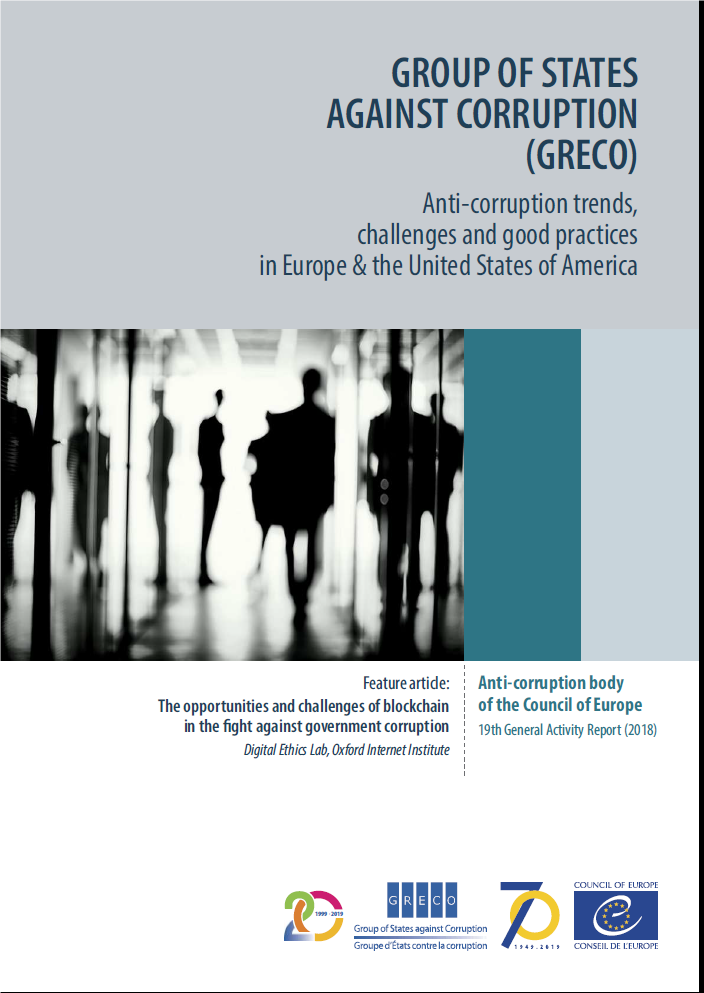
19th General Activity Report (2018)

In its annual report, GRECO reviews action taken by its 49 member states against corruption in 2018, notably in respect of MPs, judges and prosecutors, as well as its most recent evaluation round focusing on preventing corruption in central governments and law enforcement agencies.
Council of Europe Secretary General Thorbjørn Jagland said: “Corruption has devastating consequences for human rights, democracy and the rule of law. Overall our member states have made progress to put in place measures to prevent and combat corruption, but much more needs to be done. GRECO´s recommendations are not optional. Governments, parliamentarians and other national authorities should show their commitment to fighting corruption by fully implementing GRECO´s recommendations”.
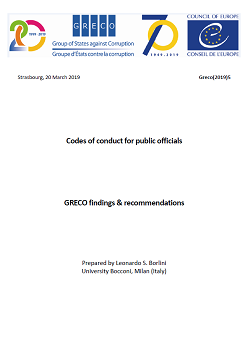
Codes of conduct for public officials, GRECO findings & recommendations

At the request of the National Anti-Corruption Agency of Italy (Autorità Nazionale Anti-Corruzione), this study provides information on GRECO’s findings and recommendations relating to the development of codes of conduct for public officials (including, in some cases, elected and/or appointed officials). Starting from the provisions of Committee of Ministers’ Recommendation No. R (2000) 10 on codes of conduct for public officials, including a Model code of conduct for public officials and its Explanatory Memorandum, the study reflects GRECO’s findings and recommendations during its evaluation rounds, with particular references to the codes of conduct for public officials (GRECO’s Second Evaluation Round) and, to a lesser extent, elected and/or appointed officials (GRECO’s Fourth Evaluation Round as regards Members of Parliament and Fifth Evaluation Round as regards central governments, including top executive functions). Read more...
The information and opinions presented in the present report are entirely those of the author alone and no endorsement by the GRECO, its Secretariat or any member of the Council of Europe or one of its bodies is expressed or implied.
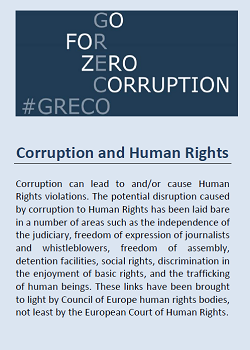
Corruption and Human Rights

Corruption can lead to and/or cause Human Rights violations. The potential disruption caused by corruption to Human Rights has been laid bare in a a number of areas such as the independence of the judiciary, freedom of expression of journalists and whistleblowers, freedom of assembly, detention facilities, social rights, discrimination in the enjoyment of basic rights, and the trafficking of human beings. These links have been brought to light by Council of Europe human rights bodies, not least by the European Court of Human Rights. Read more
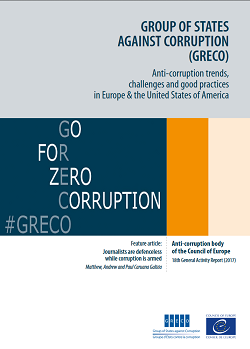
18th General Report (2017)

Adopted by GRECO 79 (Strasbourg, on 19-23 March 2018)
It deals with Anti-corruption trends, challenges and good practices in Europe and the United States of America.
It includes a feature article: "Journalists are defenceless while corruption is armed" by Matthew, Andrew and Paul Caruana Galizia.
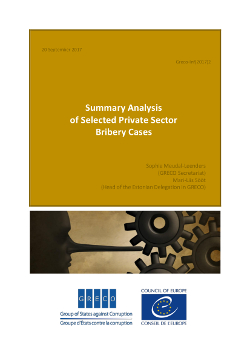
Summary Analysis of Selected Private Sector Bribery Cases

Summary Analysis of Selected Private Sector Bribery Cases, by Sophie Meudal-Leenders (GRECO Secretariat) Mari-Liis Sööt (Head of the Estonian Delegation in GRECO)
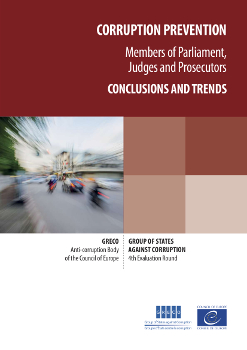
Report on Trends and Conclusions of Fourth Evaluation Round in the field of Corruption Prevention of MPs, Judges and Prosecutors

On the occasion of the 20th Anniversary of the 20 Guiding Principles for the Fight against Corruption, GRECO has published this study on “Corruption Prevention of Members of Parliament, Judges and Prosecutors (Fourth Evaluation Round) – Conclusions and Trends”.
The Report was officially presented at a Conference on “Lessons learned from GRECO’s Fourth Evaluation Round” (under the motto Go for Zero Corruption”), which was held in Prague on 9-10 November 2017.
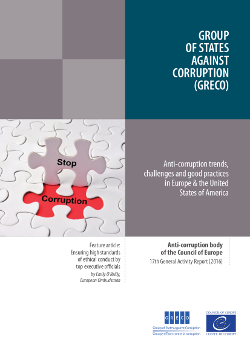
17th General Activity Report (2016)

The Group of States against Corruption of the Council of Europe (GRECO) has called on European governments, parliaments and judicial governing bodies to step up their efforts to create more effective preventive mechanisms against corruption.
In its current annual report, GRECO provides a review of its 49 member states action against corruption in 2016, and points out that countries too often over-rely on the repressive aspects of fighting corruption and underestimate the effectiveness of preventive mechanisms, which often do not exist or are too weak.
Secretary General Thorbjørn Jagland said: “Corruption is a major source of dissatisfaction and loss of trust in politics and democratic institutions. It is crucial that states have the right legislation and resources not only to investigate and punish corruption offences, but also to prevent them. There can be no tolerance for corruption, wherever it occurs.”
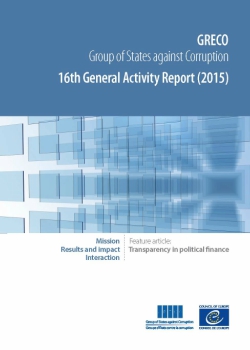
16th General Activity Report (2015)

Adopted by GRECO 71
Strasbourg, 14-18 March 2016
This report records the principal elements of our work at the end of a very demanding year. The need to reassure the citizens of our member States and build up – sometimes even recast – confidence in national institutions, systems and decision makers has seemed particularly pressing in recent times.
Marin MRČELA, Justice at the Supreme Court of Croatia, President of GRECO
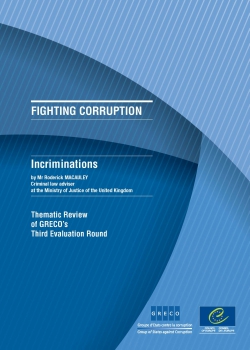
Incriminations (thematic review of GRECO's Third Evaluation Round)

As a first proposition GRECO Round III evaluation reports disclose a generally good standard of compliance with the obligations laid down in ETS No. 173 and No. 191. The GRECO evaluation teams (“GET”) discovered a very high degree of conformity with those obligations in the laws of Hungary, Malta, and Norway, for example. The reports do not pass judgment on the choice of model of criminal law unless it has a direct impact on the suitability of the law to equip the authorities to tackle corruption.
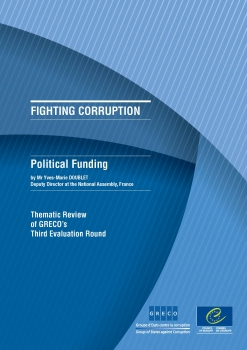
Political Funding (thematic review of GRECO's Third Evaluation Round)

By 1 November 2011, in its third evaluation round focusing on the transparency of political party funding, the Group of States against Corruption, established by the Council of Europe, had examined the legislation of 39 of the Group’s 49 member states. The data collected by the GRECO evaluation teams (GET), which had hitherto been the preserve of academics, are first of all a unique source of information on what is a fairly recent body of regulations in the history of European democracies.
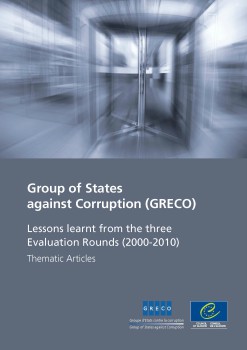
Lessons learnt from the three evaluation rounds (2000-2010)

On 1 January 2012, the Group of States against Corruption (GRECO), an enlarged agreement within the Council of Europe, will officially enter into its Fourth Round of mutual evaluations. The three evaluation rounds conducted between 2000 and 2011 assessed GRECO member States’ compliance with selected provisions from key Council of Europe legal texts, namely Resolution (97) 24 of the Committee of Ministers on the Twenty Guiding Principles for the fight against corruption, the Criminal Law Convention on Corruption (ETS 173), and Recommendation Rec(2003)4 of the Committee of Ministers on common rules against corruption in the funding of political parties and electoral campaigns.
Web resources
National Anti-Corruption Authorities
European and International organisations
Non-governmental organisations
Research Institutes and Centres
Anti-corruption platform (PACE)
Elections: the Council of Europe’s role
Action against economic crime (Council of Europe)
Events (Council of Europe)






